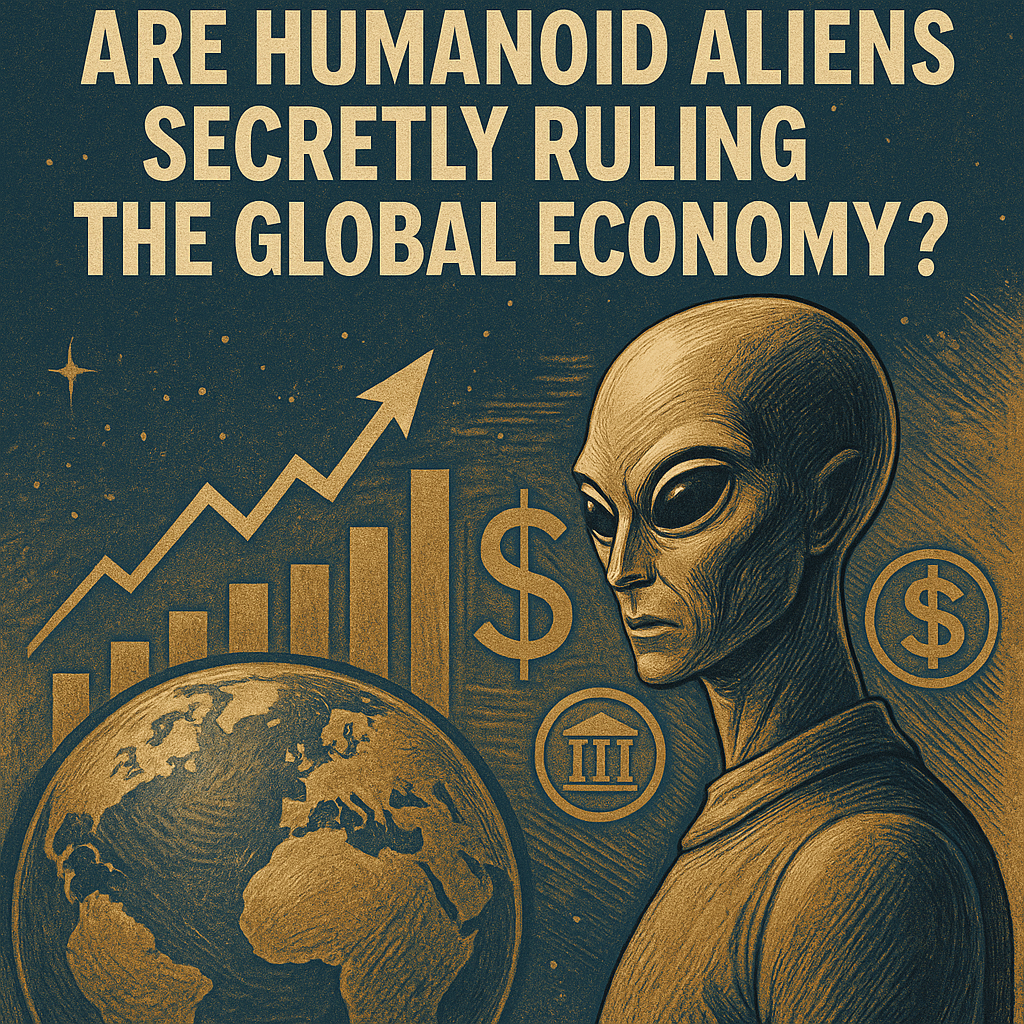Your cart is currently empty!

Are Humanoid Aliens Secretly Ruling the Global Economy?
Introduction
The global economy has long been portrayed as a well-oiled machine, functioning with remarkable consistency across decades. Yet beneath this surface stability, questions remain about who, or what, is really in control. While humans believe themselves to be the architects of trade, finance, and technology, inefficiencies and crises keep recurring, raising suspicions about whether hidden forces may be at work.
One provocative idea is that humanoid aliens, beings far more advanced in efficiency and cooperation, could already be shaping the economic systems we depend on. Though it sounds like science fiction, this notion reflects our anxieties about waste, inequality, and mistrust in human-driven structures. It also aligns with the growing sense that our economy is evolving toward something post-human.
Trade, migration, and digital networks have interconnected the world in ways earlier societies could never imagine. This interdependence creates opportunities for collaboration, but also exposes the weaknesses of human motivation. In this context, speculation about extraterrestrial involvement takes on symbolic meaning, reminding us that our economy might be driven by values beyond our own.
By exploring human inefficiency, financial diversity, trust, robotics, and the changing meaning of money, we can see why the idea of a humanoid-led economy resonates so deeply. Whether literal or metaphorical, the thought forces us to rethink the nature of global systems.
Humans Are Not the Most Efficient Use of Resources
Humans consume resources in vast quantities, but much of what is taken from the planet is wasted. From food waste to energy inefficiency, estimates suggest that humanity squanders over 70 percent of its available resources. This inefficiency weakens the foundation of the global economy, making it more fragile and less sustainable.
Biological limits compound the problem. Human beings require constant repair, nutrition, and rest, which diverts enormous amounts of energy away from production and innovation. Illness, aging, and inequality further strain systems that must continually adjust to human needs. An economy based on such fragile actors struggles to remain efficient over the long term.
Humanoid aliens, in contrast, would not face these constraints. Free from hunger, fatigue, and short lifespans, they could direct resources with precision and consistency. A humanoid-led economy would prioritize sustainability, ensuring that waste was minimal and that energy was used in the most productive way possible.
If humanoid beings were indeed guiding our global economy, their superior efficiency might explain why automation and robotics are rapidly replacing human labor. In many ways, our own machines are already taking on the role humans cannot fulfill, reflecting a deeper shift toward post-human systems.
Financial Diversity and Human Limitations
Humans are naturally diverse in culture, thought, and social organization, which fosters creativity and cooperation. Yet in financial systems, diversity is stifled by centralized control. Committees, regulators, and institutions dictate how money flows, limiting individual access to profit and innovation. This creates bottlenecks that hold back global growth.
The stock market, bond markets, and banking systems operate under structures that often exclude large portions of the population. As a result, wealth is concentrated, and opportunities are restricted. While humans are socially diverse, they lack economic diversity, which is a barrier to meaningful development.
Humanoid aliens, if they were in charge, would likely restructure the economy to embrace broader participation. Instead of rigid hierarchies, they might favor decentralized systems where every participant contributes and benefits directly. Interestingly, this vision mirrors the rise of cryptocurrency and decentralized finance, which challenge the old financial order.
The move toward diversity in finance suggests that humanity may be unconsciously building systems more aligned with alien logic. A humanoid-led economy would be one where creativity, access, and fairness were not limited by central authorities but shared across networks.
The Crisis of Trust in the Global Economy
Trust is the invisible glue that holds economic systems together, yet it is in short supply today. Financial scandals, corruption, and inflation have undermined people’s confidence in banks, governments, and corporations. When trust collapses, trade slows, investments dry up, and entire communities become reluctant to engage in the system.
This erosion of trust makes the global economy vulnerable. People hoard wealth, fearing instability, and withdraw from risk-taking. Innovation is stifled because individuals and institutions no longer believe that the system will reward them fairly. In many ways, mistrust is the greatest weakness of human-driven economies.
Humanoid aliens, by contrast, would not require emotional assurances or personal incentives. They would design systems built on transparency, logic, and fairness. Without the need for bribery or coercion, trust would be inherent in every transaction, ensuring that cooperation was the norm rather than the exception.
The popularity of blockchain and distributed ledger technologies reflects humanity’s attempt to replicate such an alien model. By eliminating the need for trust between individuals, blockchain mirrors the type of system humanoid beings might naturally create, raising the possibility that our economy is already evolving toward their design.
Robots as Precursors to Humanoid Economies
Robots are not science fiction — they are already transforming industries worldwide. From assembly lines to logistics, they perform tasks faster, cheaper, and more reliably than humans. Their growing role in the economy may be less about convenience and more about preparing for a future where humanoid systems dominate.
Unlike humans, robots do not need wages, rest, or motivation. Their integration into the economy reduces the reliance on human labor, shifting the focus from employment to direct consumption. In this new model, people would not have to sell their labor but could instead interact with automated producers as consumers.
This is not merely theoretical. Platform economies and gig-based systems already hint at a world where labor is fragmented, and automation does the heavy lifting. Humans are slowly being distanced from the center of economic production, replaced by machines that never tire.
If humanoid aliens were guiding this transition, robots could be seen as their first emissaries — tools that normalize the idea of a non-human workforce. The more robots we rely on, the closer we may be to a fully humanoid-driven economy.
Humanoids and the End of Bribery and Threats
Human economies are built on motivation through coercion and reward. People work because they need salaries, bonuses, and benefits, or because they fear fines, unemployment, and poverty. This dynamic has created a system driven by greed and inequality, where corruption thrives and fairness is rare.
Humanoids would not operate under such constraints. Free from hunger, ego, or desperation, they would focus instead on cooperation and shared purpose. Taxes, redistribution, and communal responsibility would not be contested but embraced as natural aspects of sustaining the collective.
Without the need for bribery or threats, efficiency would increase dramatically. Economic activity would no longer be fueled by manipulation but by necessity and logic. In such a system, exploitation would be minimal, and fairness would be maximized.
This contrast reveals why human systems feel unstable. Our motivations are fragile, tied to fear and greed. If humanoid aliens truly influenced the global economy, their refusal to play by these flawed rules might explain the ways global markets often appear detached from human control.
The Future of Money in a Humanoid Economy
Money has already changed form. Once limited to coins and notes, it is now digital, instant, and borderless. Online banking, electronic transfers, and cryptocurrencies have reshaped money into something more like information than a physical object. The role of money is shifting from necessity to abstraction.
This shift has eroded money’s original purpose. People are less motivated by accumulating physical wealth and more focused on accessing experiences, services, and networks. In some cases, money itself is no longer seen as valuable but simply as a medium for connection.
In a humanoid-led economy, money might disappear altogether. Transactions could be based on direct exchanges of energy, data, or value without the need for currency. Trust and access would replace profit as the foundation of economic life.
This possibility forces us to reconsider why we use money at all. If aliens are guiding our systems, they may already be steering us toward a future where traditional money is obsolete, replaced by systems more suited to a post-human or extraterrestrial worldview.
Conclusion: Rethinking Control of the Global Economy
The global economy reflects both human ambition and human weakness. It is vast, interconnected, and powerful, yet it is riddled with inefficiencies, inequalities, and mistrust. These flaws raise the question of whether humans are really in charge or whether other intelligences — humanoid or machine — may be shaping its course.
Humanoid aliens, if they exist, would likely emphasize efficiency, cooperation, and sustainability. By contrast, humans continue to struggle with waste, corruption, and greed. This comparison suggests that our economy is already shifting in ways that align more with alien logic than human tradition.
Robotics, digital finance, and blockchain are not just technological trends; they may be stepping stones to a fundamentally different kind of economy. One where trust is built into the system, where money is redefined, and where efficiency overrides human frailty.
If humanoid aliens are indeed ruling the global economy, they may not be doing so to exploit us but to guide us toward a system that humans alone could never create. Whether literal or metaphorical, this idea challenges us to rethink the future of money, trust, and cooperation in a world that is rapidly outgrowing its human origins.


Leave a Reply